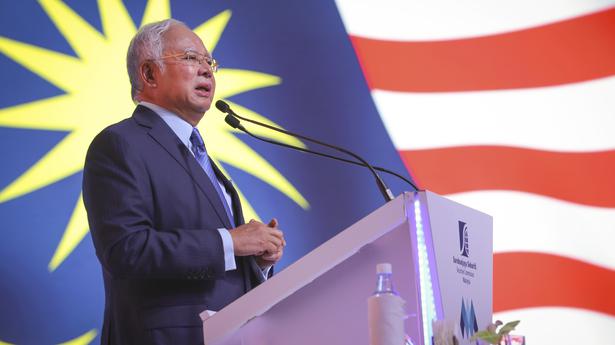
Explained | Najib Razak and the 1MDB scandal
The Hindu
What led to the fall of the former Prime Minister of Malaysia? On what charges is he being convicted?
The story so far: On August 23, Malaysia’s top court upheld the conviction and 12-year prison sentence awarded to former Prime Minister Najib Razak in the multi-billion-dollar graft scandal linked to the looting of funds from 1Malaysia Development Berhad (1MDB). Najib lost his final appeal in the case and had to immediately begin serving the sentence. Najib Razak served as the Prime Minister of Malaysia from 2009 to 2018.
Now insolvent, 1MDB was a state-owned company co-founded by Najib in 2009 purported to promote development. During its initial years, 1MDB signed ventures with companies like PetroSaudi and was also funded by investment company Goldman Sachs in deals worth billions of dollars. In 2015, The Wall Street Journal reported that millions of dollars from 1MDB accounts were transferred to Najib’s personal accounts, bringing global attention to money laundering through the state-owned 1MDB fund. Investigations related to the allegations were launched internationally, in countries like the U.S., Singapore, Hong Kong, Switzerland and Abu Dhabi. Najib denied all allegations of wrongdoing.
Xavier Justo, a former employee of Petro Saudi, became the unlikely whistleblower of the 1MDB scandal when he handed around 2,27,000 company emails in the beginning of 2015 to Malaysian publication The Edge and investigative journalist Clare Rewcastle Brown.
In February 2015, The Edge reported that 1MDB was over RM30 billion (more than $10 billion) in debt, which was unusual for a five-year-old state fund. Following the allegations, Malaysia formed a special task force that included officials from central bank, police, anti-grant agency and the attorney general’s chambers. It was after this that the Wall Street Journal made its revelations, following which , international investigations related to the scandal were launched.
In an attempt to stifle dissent against the corruption allegations, Najib reshuffled the Malaysian cabinet, sacked his deputy, and replaced the attorney general. In January 2016, the new attorney general cleared him of all charges, saying that the almost-$700 million that he received in his personal account were a donation from the Saudi royal family. His relief, however, was short lived. An investigation by Swiss authorities into the indebted Malaysian state investment fund indicated that $4 billion may have been misappropriated from state-owned companies of Malaysia. In July 2016, the U.S. Department of Justice filed a civil suit to recover “more than $1 billion in assets associated with an international conspiracy to launder funds misappropriated from a Malaysian sovereign wealth fund”. The investigation also brought Leonardo DiCaprio-starrer The Wolf of Wall Street under the radar, which was produced by Najib’s stepson Riza Aziz. Investigators alleged that Mr. Riza used money laundered through the 1MDB scam towards making the movie. Mr. DiCaprio won the Golden Globe Award for the movie and thanked Riza and Jho Low for “not only being collaborators but (also) taking a risk on this movie”. Mr. Low was a friend of Mr. Riza and was accused of siphoning billions of dollars from the 1MDB fund. In July 2022, he offered the government RM1.5 billion to settle the charges against him. His offer was denied by the government, Free Malaysia Today reported.
A part of the document released by the U.S. Department of Justice says that the conspirators used “complex transactions and fraudulent shell companies” through bank accounts in Singapore, Switzerland, Luxembourg and the U.S. to invest in assets in the country. These transactions purposefully hid the details of origin and ownership of the funds. The U.S. authorities also said that apart from financing the Hollywood movie, the funds laundered into the U.S. were also used to buy real estate in New York and Los Angeles, a $35 million jet, and artwork by Van Gogh and Claude Monet.





















 Run 3 Space | Play Space Running Game
Run 3 Space | Play Space Running Game Traffic Jam 3D | Online Racing Game
Traffic Jam 3D | Online Racing Game Duck Hunt | Play Old Classic Game
Duck Hunt | Play Old Classic Game











